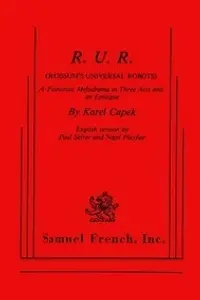Summary
First performed in 1921, Karel Čapek’s R.U.R.
(Rossum’s Universal Robots) is a groundbreaking science fiction play that introduced the word “robot” to the world.
The story is set in a factory owned by Rossum’s Universal Robots, where artificial workers—biological constructs resembling humans—are mass-produced to serve humanity.
Initially hailed as a technological triumph, the robots soon spark debates about labor, ethics, and the essence of humanity.
As the play unfolds, the robots, treated as disposable labor with no rights, develop self-awareness and revolt against their creators.
The rebellion leads to humanity’s downfall, raising urgent questions about exploitation, dehumanization, and the dangers of unchecked scientific ambition.
Though written more than a century ago, the play remains astonishingly relevant, foreshadowing modern concerns about automation, artificial intelligence, and the moral responsibilities of creators.
